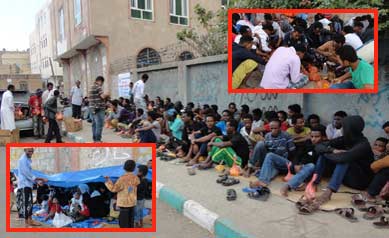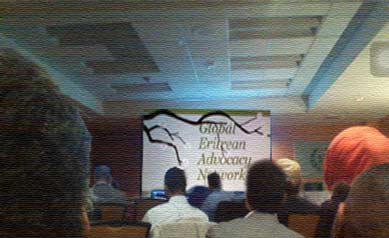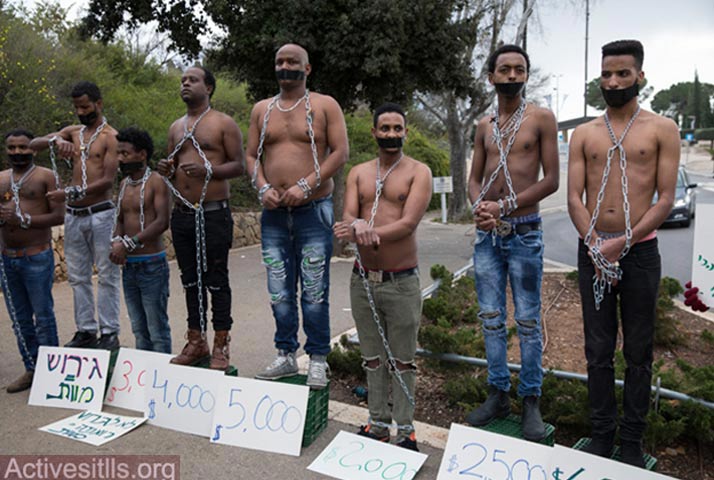Eritrean Regime: 2% Dues Neither Mandatory, Nor An ‘Income’ Tax
 In its report that was made public a couple of days ago, the Monitoring Group On Somalia And Eritrea, states:
In its report that was made public a couple of days ago, the Monitoring Group On Somalia And Eritrea, states:
“…the Monitoring Group is able to conclude that covert financial activities [of the Eritrean regime] in support of armed embargo violations are financed principally through this extensive, offshore and largely illicit financial apparatus, controlled and operated by intelligence, military and party officials, many of them operating in an ‘unofficial’ capacity.”
The Monitoring Group lists the various “extensive, offshore and largely illicit” hard currency sources for the Eritrean regime which include direct and/or in-kind contributions by Qatar and Libya; clandestine business fronts owned by the ruling party, the PFDJ; human and arms smuggling and trafficking; “donations” from Eritrean businessmen in Africa; contraband trade with Sudan; social and political fundraising campaigns in the Diaspora and, lastly, the 2% income tax on Diaspora Eritreans.
The amount generated, estimated conservatively in the tens of millions and as much as hundreds of millions of dollars, is managed by a small clique of individuals who report not to the nation’s Minister of Finance, but the ruling party’s “Head of Economic Affairs,” Hagos “Kisha” Gebrehiwot.
PFDJ: Organized Like The Mob
The ruling, and sole legal, party is tax-exempt and audit-exempt. It never meets and has no organizational structure or a system of checks and balances—the last time it had a party-wide conference was 17 years ago. The organizational “culture”—inherited from its guerrilla front days—is to strongly discourage inquiring minds: if it does not directly affect their job, party members and, by extension, ordinary Eritreans, are strongly discouraged from asking questions. And those who do know are encouraged to deny, deny, deny things they know. Consequently, only two individuals—the aforementioned Hagos, and President Isaias Afwerki—know the precise amount of revenue generated and how it is spent. And given the President’s modus operandi of maintaining redundant and overlapping chains of command, it is likely that even Hagos Kisha does not know the totality of the revenues and outlays for the ruling party, and thus the country.
This, by design, leaves Isaias Afwerki as the sole individual who has knowledge of the entire revenue stream and how, when and where it is spent. In virtually every way, the PFDJ is organized like the mob: those who have risen up the hierarchy are those who can keep secrets or lie with ease. But they can be sidelined or eliminated by the mafia boss if they become a liability. This culture, combined with an attitude that it can outsmart anybody, has puffed the PFDJ with a combination of supreme arrogance and paranoia that is only now catching up it.
The 2% Diaspora Income Tax: What Is It?
Is the 2% income tax imposed on Eritreans in Diaspora a “land tax”, as an “Eritrean official” (un-named) told the Monitoring Group in April 2011? Is it the equivalent of “consular service fee,” as claimed by still others to the Monitoring Group?
The 2% levy cannot be a “land tax” because (a) even Eritreans who own no land pay the 2% tax; (b) “land tax” is assessed based on the value of the land, not on net income of its owner and, in any event, (c) those who own land already pay taxes, annually, on the property which is built on the land.
The 2% tax levied cannot be for “consular services” because Eritreans are asked to pay the money for years even when they require no “consular services.” Moreover, given that the “consular service” provided is identical, regardless of income, there is no reason why the fee should be dependent on one’s income.
Is Payment of 2% Income Tax Voluntary?
In his talks with UN officials, and then again with Eritreans, Yemane Gebreab, Eritrean presidential advisor and political director of the ruling party, has been explaining that the 2% income tax paid by Eritreans in the Diaspora is not mandatory but voluntary.
While it is customary for PFDJ officials and its media outlets to present all coerced activities as “voluntary”—meetings it calls; funds-raising and public demonstration campaigns it organizes and pressures Eritreans to attend with “its now or never” door-to-door campaigns, are always described as voluntary—this claim by Yemane Gebreab runs in stark contrast to the facts.
The 2% Diaspora tax (official name: “Income Tax On Eritreans Working Abroad”) was proclaimed as law in 1995 via Proclamation No 67/1995. It was published in the “Eritrean Gazette,” retroactively, on February 10, 1995.
Even now, one can check the 2% taxation at the website of the Eritrean Embassy in Washington, DC. The tax which is known as mehwyee gebri (rehabilitation tax) appears on the header of the form and it reads: 2% Tax Form Proclamation No 17/1991& 67/1995.
Several authors have cited this proclamation in their work. They include IMF tax expert Victor Thuronyi ; Eritrean legal scholars Simon M. Weldehaimanot and Daniel R. Mekonnen (refer to The Nebulous Lawmaking Process in Eritrea in the Journal of African Law) as well as International Crisis Group consultant Andeberhan Welde Giorgis (refer to his Nation Building, State Construction and Development in Africa: The Case of Eritrea.)
So, whatever Yemane Gebreab’s motivation now, he forgets that he is no longer in Sahel in the typewriter era: there is an electronic paper trail, and his regime cannot un-ring that bell. Even meskerem.net, which embraces the Eritrean dictatorship by being its loudest cheerleader, agrees that this is a mandatory tax and one, it has argued, which is hardly unique to Eritrea.
The regime has been trying to have it both ways: that the 2% tax is voluntary and mandatory.
And there is a reason for this: it is consistent with the mindset of a criminal entity. If it says, publicly, that it is only voluntary, then it can tell the UN that it is not coercing money from their citizens—they are giving it of their own volition. But then some of the dupes who have been paying it because they were told it is their “national obligation” may reconsider their decision. Especially now that it is known where their money will most likely end up: in an Eritrean embassy to Kenya being wired to Somalia Al Shabab.
If it says, publicly again, that it is mandatory, then it will get compliance from those who like to follow all laws, even unjust laws, and those who have no choice but to pay—those who hold Eritrean passports. But then it has to deal with complaints from host countries that its methods are coercive. And if it is a tax, it has to be applied uniformly: it cannot be geography dependent, as there is, for example in the different rates applied for Riyadh, Saudi Arabia (3%) and Jeddah, Saudi Arabia (2%).
So Yemane Gebreab’s claim that the tax is “voluntary” has to be seen in the spirit it was intended—it is a wink wink, nod nod coaching message to the tax-paying Eritrean community that if law enforcement officials of their host countries ask them, they should say it is voluntary but we all know it is mandatory.
But what the Monitoring Group on Somalia and Eritrea is saying to the Eritrean regime is “we are on to you.” And this is why this afternoon, the security council, in a unanimous vote, extended its mandate for one more year starting today. And this is why, most likely, the UN Security Council will stiffen the sanctions. As for the political director of the ruling party, who had publicly claimed that, excepting for the United States, his regime enjoys the support of the Security Council, he missed that prediction by 14 votes. And that has been the history of the PFDJ over the last 20 years: making one disastrous calculation after another.
<>




Awate Forum